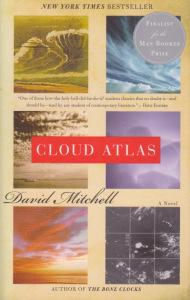 “Chiasm” is a literary technique based on the name of the Greek letter chi, shaped like a latinate X.The idea is fairly simple and generally resembles a sideways V more often than an actual X. It goes like this: a poem, or story, begin at a large, or wide premise, narrows down in steps to a center, and then, by corresponding steps, again out toward a larger, or wider resolution.Another way to think of it is a set of Matryoshka dolls; first you take them apart, and then you put them back together.David Mitchell’s Cloud Atlas is a chiastic story.Starting on a cross-ocean voyage at an indeterminate time in the recent past centuries, it moves on to a Briton on the continent in about the turn of the last century, then a mid-twentieth-century American investigative journalist, a late twentieth-century or present-day rogue publisher in Britain, a clone in future Korea, and finally, to a planet of the apes-like Hawaii of the distant future.Not really finally, though, since after the center of the X, it moves back outward through the nesting stories to bring us back to the beginning.
“Chiasm” is a literary technique based on the name of the Greek letter chi, shaped like a latinate X.The idea is fairly simple and generally resembles a sideways V more often than an actual X. It goes like this: a poem, or story, begin at a large, or wide premise, narrows down in steps to a center, and then, by corresponding steps, again out toward a larger, or wider resolution.Another way to think of it is a set of Matryoshka dolls; first you take them apart, and then you put them back together.David Mitchell’s Cloud Atlas is a chiastic story.Starting on a cross-ocean voyage at an indeterminate time in the recent past centuries, it moves on to a Briton on the continent in about the turn of the last century, then a mid-twentieth-century American investigative journalist, a late twentieth-century or present-day rogue publisher in Britain, a clone in future Korea, and finally, to a planet of the apes-like Hawaii of the distant future.Not really finally, though, since after the center of the X, it moves back outward through the nesting stories to bring us back to the beginning.
I’m not going to attempt to retell the story here, so don’t worry—it doesn’t get any more complicated.There are, however, a couple of remarkable things about the tale.In the brutish, nasty, post-collapse future that marks the center of the narrative, religion is central.Some of the Hawaiians have come to believe the protagonist of the nesting story, the clone mentioned above, was a god.To find her story, however, you’ll need to read the book.Suffice it to say, that origin myth is part of the overall complex structure.The second of the remarkable features, and one that makes this book very salient, is that in all the ages the issue of accepting those who are different is central.
In the outside framing story, the initial and terminal points of the chi, one of the characters is a missionary.He’s trying to “improve” he life of Polynesians by making them into slaves, whereby they benefit from the largess of Christianity.Quite a bit of the narrative draws its energy from the eventually faltering sense of superiority of the AngloSaxon “race.”In that sense it’s definitely a parable for our time.A story that deserves to be read.Defying easy genre identification, Cloud Atlas is a thought-provoking novel that doesn’t fear religion and its larger implications.A couple of the nesting stories have exquisite twist endings worthy of the Twilight Zone.This book will make some demands on your time, but its message makes it a sound investment in a world rapidly heading toward a future that reveals just how troubled our species is.
